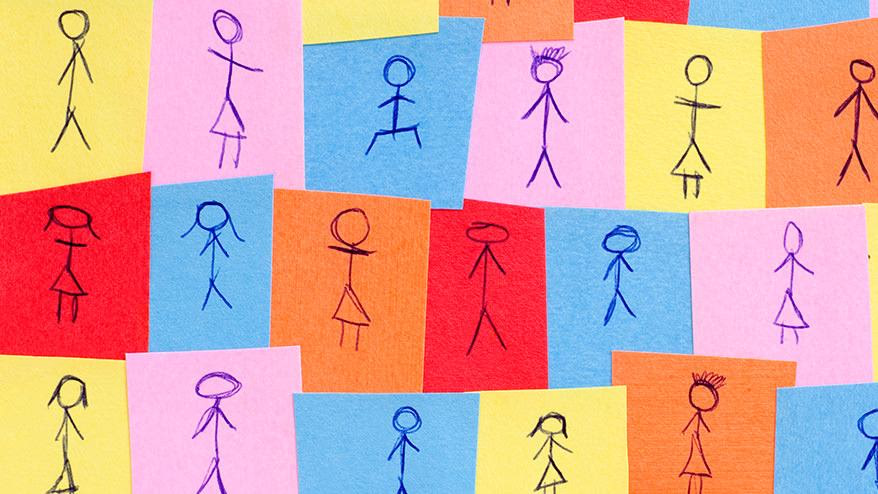Nice to meet you. I'm Inui, and I've been working in the Quality Control Department for five months.
Monosus has many people with a variety of backgrounds, not just in the web industry, and before I joined the company, I was aiming to go to graduate school to study LGBT.
I am currently enjoying my life as a working adult, but I wanted to share what I learned while studying for my exams. One day, I received an invitation from Editor-in-Chief Nakaniwa to write an article. This article was a dream come true, and I think it will continue to be a series in the future. Thank you for your support.
Reasons why I wanted to learn about LGBT
LGBT is an acronym for lesbian (female homosexuals), gay (male homosexuals), bisexual, and transgender (people whose gender identity does not match their physical gender) and is used as a general term for sexual minorities.
The reason I wanted to learn goes back to my high school days. The high school I went to had relaxed school rules, and earrings, makeup, and dyed hair were all OK. Shibuya was within walking distance, so I would go there to hang out after school. It was a typical "Tokyo high school student" atmosphere. There were a lot of glamorous girls, especially. However, I was far from that atmosphere, and rather than going to Shibuya with everyone after school to take Purikura photos, I would rather go home and play games.
I gradually began to feel uncomfortable and got stomach aches on my way to school, and eventually I was unable to attend and dropped out in the spring of my second year.
This sparked my interest in mental health issues, and I decided to major in psychology at university. I hoped that I might find the cause of the worries I had in high school, but I was unable to find any clues, and my interest in psychology gradually waned.
While feeling frustrated and unable to understand the cause, I was searching for a solution when I took a required course in gender studies.
Gender was originally a term in linguistics meaning the sex of a noun, but it is now widely known to refer not to biological sex differences (sex), but to social and cultural differences in terms of masculinity, femininity, and ideas about what men and women should be like*1.
After taking this gender studies class, I realized that the discomfort I felt in high school came from the belief that I had to act "girly" in order to fit in with the people around me.
I was impressed that I was able to understand the cause of this vague feeling, and that it has been established as an academic field.
It was in this gender studies class that I became so fascinated with that the topic of LGBT came up.
In class, we watched a DVD of interviews with people with disabilities, in which they talked about the various hardships they faced, including being bullied as students and not receiving understanding from those around them.
I was heartbroken when I imagined how the hardships I experienced in the small world of high school could be felt across society. I wondered if there was anything I could do to support them, and since I had dreamed of becoming a researcher since I was a child, I aimed to study LGBT issues in graduate school.
What I learned and saw
After I started studying for the entrance exams in earnest, I had the opportunity to join an LGBT group at another university, where I was able to learn about LGBT issues while interacting with people in the same situation. The first thing I noticed was that everyone there was just like any other "ordinary" university student. At the same time, I realized that I had unconsciously built a wall between myself and "people who are different from me," and I felt very remorseful.
We had common hobbies and enjoyed talking about silly things, so we quickly became good friends. Even now, we still go to the movies and eat out together, and our relationship remains good.
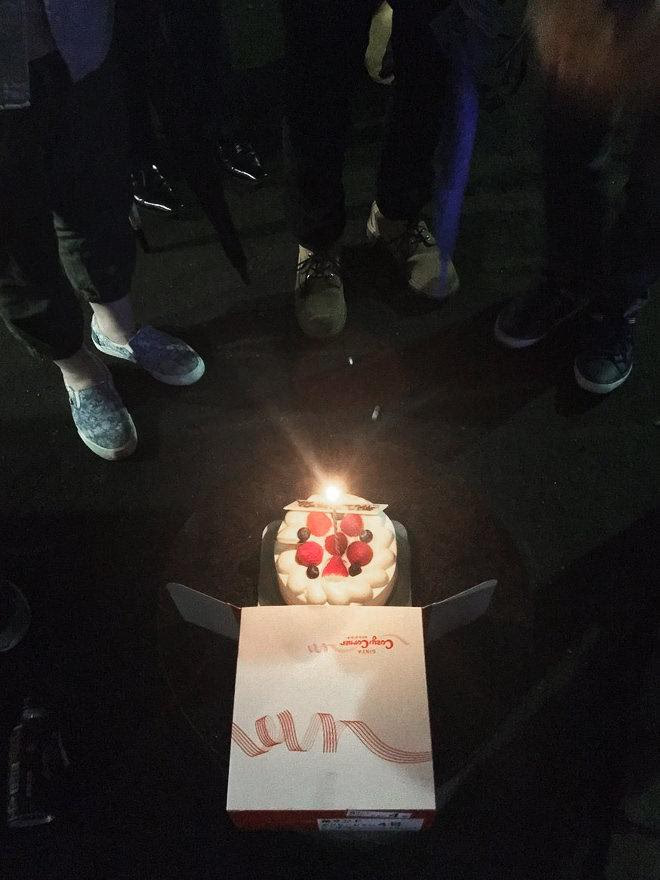
Celebrating our circle's first anniversary at Miyashita Park. The sight of a dozen people crowding around a No. 5 whole cake is a fond memory.
Here's some concrete data.
The 2015 Dentsu LGBT Survey, which targeted approximately 70,000 people nationwide, reported that 7.6% of the population in Japan, or about 1 in 13 people, are LGBT*2. Some people may feel that this is a surprisingly large number. Because it cannot be determined by appearance, like the club members I met, there may be cases where you have not noticed that they are around you.
However, survey results show that 68% of LGBT people have experienced bullying or violence*3, and it has also been reported that 58.6% of people with gender identity disorder have had suicidal thoughts at some point, and 28.4% have engaged in self-harm or attempted suicide*4.
Although it is difficult to visualize, I think you can understand that the situation is serious.
This is a sensitive issue and we need to be careful, but urgent action is needed. What can we do?
Here are some things that I feel anyone can do right away.
Don't make LGBT a taboo
When I first joined the club, I was a little too reserved, but I was worried about how to interact with them and what to call them. Then one day, I decided to ask them honestly. To my surprise, they replied, "If there's anything you don't understand, please ask me."
Also, one club member said, "It's more of a hassle when they create an atmosphere where you can't touch them." Of course, there are times when you don't want to say anything or want others to keep it a secret, but I think this becomes an issue of communication regardless of whether you're in the minority or majority.
If we can interact with each other while respecting each other, without building walls because we "don't understand," new values will emerge.
Be aware that "there may be people around you"
I also heard people say, "I know about LGBT, but it's sad that many people think, 'There aren't any around me.'" With this kind of mindset, it's hard to become interested in the issue.
Therefore, you may be unknowingly engaging in discriminatory behavior.
For example, the words "homo" and "onee" are considered discriminatory. Even if the person in question does not mean to, they may be making others feel uncomfortable.
Of course, we should absolutely stop doing nonsense like mocking LGBT people.
As the previously mentioned data shows, one in 13 people are LGBT, so it's actually something very close to us. Even just being aware that there may be LGBT people around you will likely change the way you speak and act.
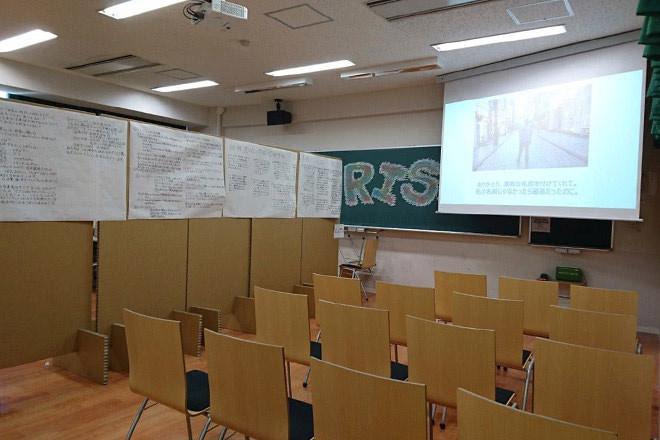
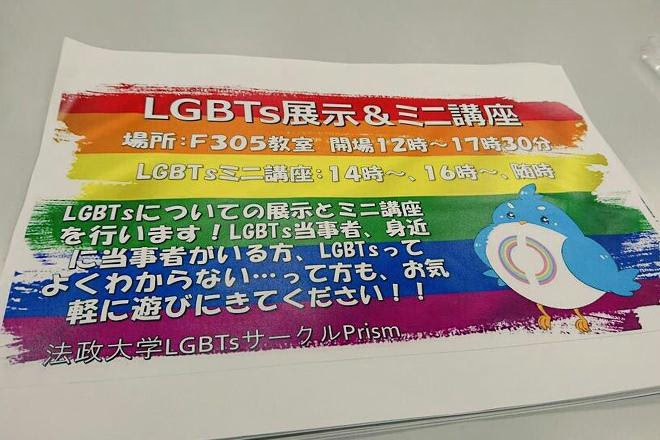
We also had an exhibition and presentation at the school festival. Everyone is working positively.
lastly
Through LGBT, I learned how happy and wonderful it is to be able to say that you like what you like. Whether it's a person or an object, if something excites you and moves you, it should always be right for that person. I hope that we can create a society where each person's "likes" are respected.
In recent years, it is said that understanding of LGBT is spreading, but it is also true that discrimination and prejudice still remain. However, I feel that it is more important than anything else to continue to have a positive attitude. More and more companies and local governments are supporting LGBT people.
Among them, we would like to introduce Tokyo Rainbow Pride, an NPO organization that is sending out positive messages.
Their motto is "Be yourself, have fun, be proud," and every May they hold an event called "TOKYO RAINBOW PRIDE" at Yoyogi Park. This year, it will be held on May 6th and 7th.
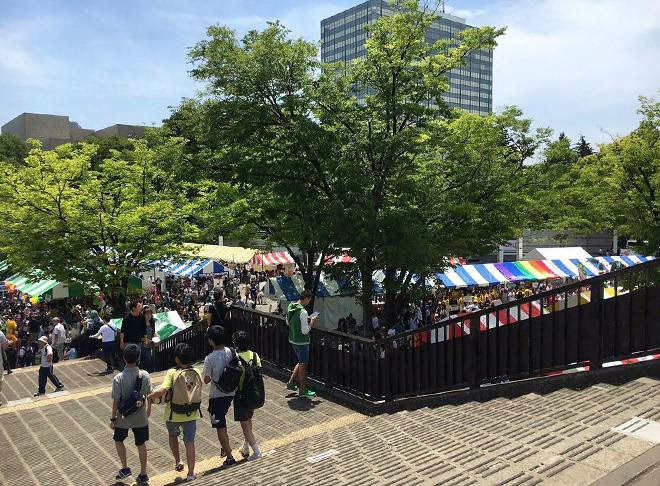
The TOKYO RAINBOW PRIDE venue from last year. It was very crowded!
Also, various events will be held between April 29th and May 7th during Rainbow Week, and you may see rainbow flags around town.
I hope this will be an opportunity for people to think about LGBT issues.
I will also be joining TOKYO RAINBOW PRIDE!
In the next issue, I will report on my coverage. I hope to be able to give you an idea of the state and atmosphere of the venue. Please look forward to it!
References
*1 Yumiko Ehara/Masahiro Yamada 2008 "Introduction to the Sociology of Gender" Iwanami Shoten
*2 Dentsu Diversity Lab 2015 "Dentsu LGBT Survey 2015" ( PDF )
*3 Respect for Life. White Ribbon Campaign 2013 "Survey on the Actual Condition of LGBT School Life (2013)" ( PDF )
*4 Nakatsuka Mikiya 2010, Gender Identity Disorder in School Health: Cooperation between Schools and Medical Care, Japan Medical News No. 4521 60-64
TOKYO RAINBOW PRIDE2017
This year's theme is "CHANGE - The future can be changed."
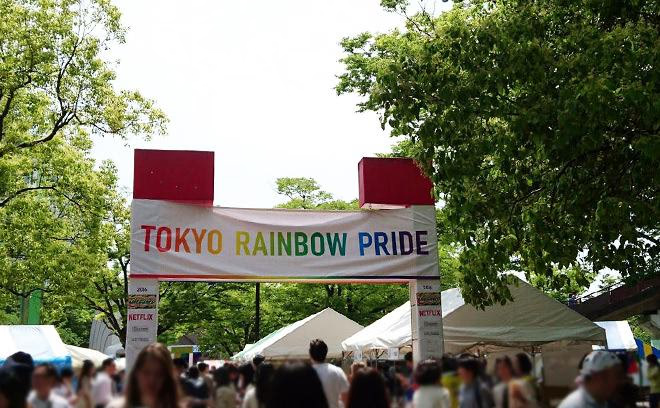
Event details Dates: Saturday, May 6th and Sunday, May 7th, 2017, 10am-6pm Parade: Sunday, May 7th, 2017 (details to be announced later) Venue: Yoyogi Park Event Square & Outdoor Stage, Tokyo For details on each content, please click here
http://tokyorainbowpride.com/about-trp2017/parade-festa
Rainbow Week Dates: Saturday, April 29th, 2017 (National Holiday) - Sunday, May 7th, 2017
Venue: Tokyo and other locations nationwide Click here for details of each event
http://tokyorainbowpride.com/about-trp2017/rainbow-week
